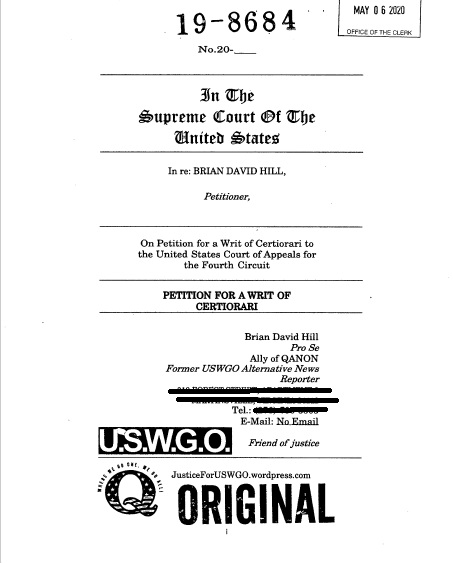by Laurie Azgard
There are the top seven reasons why the Supreme Court of the United States of America should grant the petition for a writ of certiorari in the case of “Brian David Hill v. United States District Court for the Middle District of North Carolina” [originally entitled “In re: Brian David Hill; mandamus relief].
- This case surrounds the issues of a repeated pattern of fraud upon the court by an officer of the court which is the federal prosecutor Anand Prakash Ramaswamy, and the district court has ignored all of the documented frauds. The federal judge has shirked his responsibility to maintain the integrity of the U.S. district court. That is going against well established case law across the country on the issue of frauds upon the court.
2. This case surrounds the dereliction of duty, prejudice, and bias of a single federal judge Thomas David Schroeder of Winston-Salem, North Carolina. A judge who has been displaying troublesome behavior of ignoring case law from higher courts in past rulings. A judge who had ignored evidence and witnesses and refused to call forth expert witnesses who would have proven that the criminal defendant’s claims are full of merit and facts.
3. This case brings up an issue of older fraudulent begotten judgments. Ever since Congress had passed the ‘anti-terrorism and effective death penalty act’ [AEDPA] law, all writ of habeas corpus petitions are subject to a one year statute of limitations. The Supreme Court had made rulings in the past that actual innocence is a major exception to the one year statute of limitations. However various case law rulings have also said that fraud upon the court “can be challenged at any time” and cannot be subject to a statute of limitations because frauds affect the clerical work and rulings of the entire judicial system. All courts have constitutional inherit and implied powers to keep a check on its own records and ruling to be sure that they are all factual and well grounded in law, at least they are supposed to. If a ruling by the court was based on fraudulent arguments, fraudulent evidence, fraudulent facts, or even fraudulent claims, then this taints the integrity and credibility of the entire federal or state judiciary.
4. The Supreme Court can end the issues of the wrongful denial of the writ of mandamus by the fourth circuit U.S. court of appeals. The petition for writ of mandamus to the U.S. court of appeals was denied under misunderstood, false, and/or incorrect pretenses. The writ never should have been denied in the context of compelling a judge to fulfill his ministerial duties to act upon all pending motions directed to him by the clerk of the court. Once the clerk refers the motion to the judge for review, he/she can deny or grant the motion. A judge acts in excess of lawful jurisdiction by deciding to never act upon a pending motion assigned to him by the clerk of the court. If SCOTUS does not make a decision on overturning the bad decision, then this sends the message to the judge that he/she can shirk his responsibilities and can forever just ignore motions and refuse to act upon any motions he/she disagrees with. Then with no decisions ever made, no appeal can ever be allowed to being filed, thus justice is systemically denied to all parties whoever go through that judge in that court. Due process will permanently be lost. No more rule of law.
5. The Supreme Court [SCOTUS] can finally make an permanent issue of criminal defendants being allowed to challenge frauds upon the court at a later time, even after the one year statute of limitations and can bypass AEDPA. Actual innocence claims can already be filed after the one year deadline for habeas corpus petitions, then why not the ground of fraud upon the court in a criminal case?
6. SCOTUS can put the district court and court of appeals back on track. They aren’t enforcing relevant case law and treat case law like it isn’t credible or doesn’t exist. Case law was created to give guidance to all lower courts. The Supreme Court creates case law to be enforced by all of the lower courts, when the case law is set to be precedent. When lower courts disregard and disrespect the Supreme Court and appeal court decisions, then it creates a disrespect of authority by the activist judges. Judges start disregarding and disrespecting supervisory courts and make whatever ruling that they want to, and not fearing any consequences.
7. The SCOTUS can question the behavior of attorney/officer of the court, “Anand Prakash Ramaswamy” and compel the lower court to have him held accountable for his misconduct and violation of American/state Bar rules 3.8 and 4.1. They can hold him accountable for his fraud, lies, and dishonesty. Courts used to punish anybody who was caught being dishonest, obstructing justice, and for perjury. Courts used to hold government lawbreakers accountable. Now nobody holds federal and state prosecutors accountable for violating the law and violating the rules. That goes against the ‘rule of law’ that democrats keep preaching about and the founding fathers had forewarned of. The loss of the rule of law is dangerous to the republic in the USA and is dangerous to the little-d democracy of our elections.
The Supreme Court should grant Brian Hill’s petition for writ of certiorari. It is something that SCOTUS needs to seriously consider. This petition appeal is life or death for Brian Hill. Denying his petition will open up a protection for fraud in any criminal court case and creates the allowance of lying to win a court case. Lies will win cases while truth is discouraged and ignored by federal judges. This is very dangerous for our republic and must be discouraged at all costs by the highest court of Constitutional resort, the Supreme Court of the United States.
